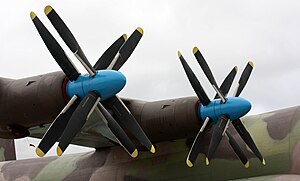Kuznetsov NK-12
| NK-12 | |
|---|---|

| |
| NK-12M Turboprop engine on a Tu-95 at RIAT Fairford 1993 | |
| Type | Turboprop |
| National origin | Soviet Union |
| Manufacturer | Kuznetsov Design Bureau |
| Major applications | Antonov An-22 Tupolev Tu-95 Tupolev Tu-114 |


The Kuznetsov NK-12 is a Soviet turboprop engine of the 1950s, designed by the Kuznetsov design bureau. It drives large eight-bladed (four per propeller) contra-rotating propellers 5.6 m (18 ft; 45 in) in diameter, and 6.2 m (20 ft; 4.1 in) in the NK-12MA and NK-12MV. It is the most powerful turboprop engine ever built.[1]
Design and development
The design that eventually became the NK-12 turboprop was developed after World War II by a team of deported German engineers under Ferdinand Brandner, which had worked for Junkers previously. Thus, NK-12 design evolved from late war German turboprop studies. This started with the post-war development of the wartime Jumo 022 turboprop design that developed 6000 eshp in a 3000 kg engine. The effort continued with a 5000 ehp engine that weighed in at 1700 kg, completed by 1947. The evolution to the TV-12 12000 Ehp engine required extensive use of new Soviet-developed alloys and was completed in 1951.[2]
The NK-12M developed 8,948 kW (12,000 ehp), uprated in the NK-12MV to 11,033 kW (14,795 ehp) and reaching 11,185 kW (15,000 ehp) in the NK-12MA. The NK-12 remains the most powerful turboprop engine ever built. Only recently the Progress D-27 and Europrop TP400 came somewhat close. It powered the Tupolev Tu-95 bomber and its descendants like the Tu-142 maritime patrol aircraft and the Tupolev Tu-114 airliner (with NK-12MV), which is still the world's fastest propeller-driven aircraft (despite the fact that all Tu-114s have been retired). It also powered the Antonov An-22 Antei (with NK-12MA), the world's largest aircraft at the time, and several types of amphibious assault craft, such as the A-90 Orlyonok "Ekranoplan" and the Zubr class LCAC.
The engine has a 14-stage axial-flow compressor, producing compression ratios between 9:1 to 13:1 depending on altitude, also controlled by variable inlet guide vanes and blow-off valves. The combustion system used is a cannular-type: each flame tube is centrally mounted on a down-stream injector that ends in an annular secondary region. The contra-rotating propellers and compressor are driven by the 5-stage axial turbine. Mass flow is 65 kg (143 lb) per second.[3]
Applications
- A-90 Orlyonok
- Zubr class LCAC
- Antonov An-22
- Tupolev Tu-95
- Tupolev Tu-142
- Tupolev Tu-114
- Tupolev Tu-116
Specifications
General characteristics
Components
Performance
- Maximum power output: 11,033 kW (14,795 ehp), for NK-12MV
- Overall pressure ratio: 9.5[3]
- Turbine inlet temperature: 1250K[3]
- Specific fuel consumption: 0.360 lb/shp-hr [4] 0.219 kg/kW-hr for NK-12MA and NK-12MV
- Power-to-weight ratio: 3.7 kW/kg (2.3 hp/lb), for NK-12MV
See also
Related lists
References
- ^ Tewari A. Atmospheric and Space Flight Dynamics: Modeling and Simulation with MATLAB® and Simulink®. Springer Science & Business Media. 2007. P. 272
- ^ Kuznetsov NK-12 (Russian Federation) - Jane's Aero-Engines
- ^ a b c d e f g Creation of the TV-2 (NK-12) turboprop engine
- ^ Civil Turboshaft/Turboprop Specifications
External links
| This aircraft engine article is missing some (or all) of its specifications. If you have a source, you can help Wikipedia by adding them. |
